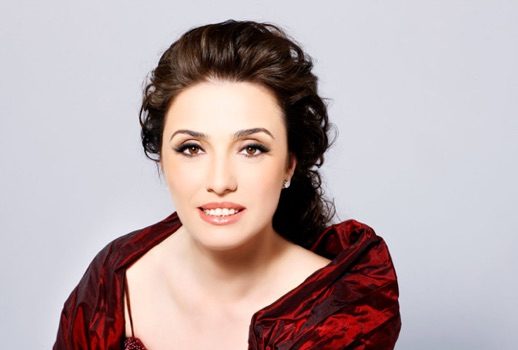

Though in her early 40s Jaho became the most convincingly adolescent geisha I’ve ever seen. Many sopranos affect silly child-like voices and overly precious attitudes to convey the innocent teenaged bride but then quickly evolve into full mature diva mode in the second act. Not so Jaho whose artless portrayal always convinced me her Cio-Cio-San was still under 20 years old at the tragic finale.
Her vivid immediacy and candid demeanor grabbed me instantly and I felt myself begin to tear up nearly as soon as she entered. And, yes, high-note connoisseurs, she took the high D-flat, shining big and loud.
Her magical entrance accompanied by her colorfully-costumed female entourage was again one of the visual highpoints of the late Anthony Mingella’s spare and elegant production. I’ve seen it a half-dozen times since its premiere in 2006 and it remains one of the Met’s most successful. I continue to be a fan of its use of three bunraku puppeteers who animate Butterfly’s highly stylized child which produces a more complex and poignant figure than any human youngster could.
The one aspect that hasn’t worn so well is the staging of the love duet that concludes the first act. When I first saw it I was enchanted by the lanterns, the descending lattices of flowers and the shower of petals that rain on the two lovers. Now I find it all a bit much, out of harmony with the staging’s otherwise notable restraint. But I did notice one thing this time which was perhaps a particular feature of Jaho’s portrayal—during that passionate duet she almost never looked at Pinkerton.
And as the evening progressed I realized that her Butterfly is less helplessly in love with a particular man than in her desperation to escape her unhappy and mundane life she enveloped herself in an all-consuming romantic obsession. Thus she’d rather experience the ecstatic extremes of her doomed existence than settle for domestic placidity with Yamadori.
Jaho’s second act had a nearly unbearable tragic intensity. “Un bel di” became a confidential and rapturous prophecy rather than a big moment designed to win applause and directed at the Family Circle.
She listened to Sharpless attempt to read his letter with a heart-breaking serenity broken only by her eagerness for the good news that never arrived. “Che tua madre” eschewed melodramatics and the “Flower Duet” was imbued with a simple and earnest hope for reconciliation. Jaho quietly drew the audience into an intimate conversation rather fling her emotions out into the auditorium with veristic abandon.
But also in that act the frailty of Jaho’s instrument began to intrude on her otherwise expert portrayal. The weak middle voice where so much of the conversational music lies can be raw and unbeautiful. Shimmering pianissimi were her glory but as the evening wore on any high note above mezzo forte emerged driven and painfully sharp marring those potentially thrilling Puccinian climaxes.
By the third act her stamina faltered as it was far less effective than what had come before. Of course those final scenes always bring out all my dislike of Puccini’s sadism toward his female “victims” as Butterfly’s wings are pulled off with excruciating precision.
The devastating “Tu tu piccolo iddio” usually wipes me out and I selfishly want my Butterfly to flood the theater with oceans of surging soprano anguish but by then Jaho sounded small and pinched and her placement back midway on the stage further diminished the effect. For the first time in my memory I was dry-eyed and unmoved as clueless Pinkerton entered to witness the catastrophe he helped bring about.
The Met’s unimaginative and repetitive Puccini casting continues to baffle me: in a week that brought Susanna Phillips’s 46th and 47th Musetta, Thursday’s Butterfly featured Maria Zifchak’s 90th Suzuki! She was featured in the production’s premiere 12 years ago and has sung all but six of its subsequent iterations.
I happened to catch Elizabeth DeShong at one of those six and what a pleasure to hear the role sung by a warm and attractive voice rather than Zifchak’s acrid one. While she ably embodies her character’s fierce loyalty to her mistress, Zifchak’s portrayal betrays no other exceptional vocal or dramatic qualities that would justify its ubiquity.
Now in his 20th year at the Met, Roberto Aronica didn’t attempt to make Pinkerton particularly boorish or unsympathetic but his brawny overloud singing contrasted markedly with Jaho’s more subtle approach. He can belt out house-filling Puccinian high notes but surely someone who now regularly sings Radames and Otello might no longer be the best choice for the American seducer.
In addition unlike other Pinkertons I have seen in this production he looked a good generation older than Cio-Cio-San which lent another uncomfortably distasteful dimension to their relationship.
In his first Met Sharpless in his 26 years with the company, Roberto Frontali in the first and third acts too lent a gruffer, more voluminous baritone than one usually hears to the Consul. Yet his nuanced acting in the second act where his embarrassed bewilderment at the pathetic situation his friend has caused proved unusually moving.
Tony Stevenson buzzed about efficiently as Goro while the fine baritones Paul Corona and Hyung Yun stood out as the Commissioner and Prince Yamadori. Edyta Kulzchak was another surprisingly frequent Butterfly presence; her 66th Kate Pinkerton over 14 years!
As usual conductor Marco Armiliato got the job done but without much imagination or nuance and tended to blast out the big climaxes while still being somewhat considerate to his leading lady. This was however not a particularly good week for Italian conductors leading works by signature Italian composers at the Met.


























Comments